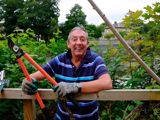Margaret's story
Margaret cares for her husband Robert who suffered from a debilitating stroke. She shares her story as an unpaid carer and how connecting with others has helped them both.
Margaret has been a carer for many years throughout her life. Born in Lancashire in the 1940s, she first found herself in a caring role from an early age; initially helping to look after her mother who suffered a stroke when Margaret was just eleven, then helping to look after her grandparents when she moved in with them after her mother sadly passed away when Margaret was only sixteen.
More recently, her husband Robert had a major stroke having already suffered from several heart attacks previously. The stroke left Robert with significant loss of vision and hearing. It also left him reliant on Margaret’s care and support.
“Prior to the stroke, Robert had a number of heart attacks but he was not totally dependent on me. But since his stroke, he can’t manage outside the house. He doesn’t see things; he walks into things. There has to be someone there for him. Not 24/7, but certainly for the majority of the time.”
Following Robert’s stroke, they decided to move home to Midsomer Norton as their surroundings in the small nearby village of Hallatrow were proving difficult due to Robert’s condition.
“We needed to move, Robert just couldn’t manage independently in the village. There were no pavements and as he’d lost his peripheral vision, he was in danger of stepping in front of cars. We also needed somewhere where I easily get to the shops by foot,” Margaret explained. “We lost a lovely big kitchen in our last house (which I moan about every day if I can!) but where we live now is much better for the amenities.”
Reaching out
Like many people who suddenly find themselves having to look after a partner due to a disability or illness, Margaret did not recognise herself as being a carer at first. Neither did she notice the impact it was having on herself. For her, it was just something she needed to do.
“Initially it doesn’t have an impact, because you don’t realise you’re doing it,” explained Margaret. "You do it out of a sense of duty. It’s what anyone would do for a daughter, very close friend or partner. But then you realise it’s difficult. I’m pretty much tied up. I either have to take Robert with me when I go out or make sure someone can pop in – it’s not always easy.”
"It took me months and months to recognise that I was a carer"
Whilst looking after Robert day in, day out, Margaret started to realise just how isolating her situation had become and she didn’t know where to turn to for support. It was actually a close friend of Margaret who advised her to contact The Carers’ Centre for help.
After speaking with a member of the team, Margaret gained useful practical advice to help with her caring role and together with Robert, they enjoyed some of the wellbeing breaks organised by the centre. She also became involved Carers’ Voice - a group where she and others with experience of caring get together to make positive changes for carers in the local community.
Margaret explained how it was the social aspects of these activities that made a real difference to her. It was a place she could relax and escape the feeling of isolation. A place where she could spend time with others who understood what she’s going through.
“The Carers’ Centre has lots of welcoming support groups - it’s amazing what you learn. It’s also a time for you to unwind and talk to other people,” said Margaret. “We treat Carers’ Voice as a social gathering as well, and it’s lovely. We have a chat over sandwiches and a cup of tea and work together to get something done. Something positive.”
Finding support through volunteering
Margaret’s involvement with The Carers’ Centre didn’t end there. Both her and Robert also went on to volunteer for the charity by lending a helping hand at carer wellbeing activities and bigger events.
Volunteering has been shown to have a positive impact on mental health and wellbeing, particularly for people who may feel socially isolated. For Margaret and Robert, it gave them an opportunity to give something back whilst enjoying the many benefits that come with volunteering.
Volunteering doesn't only give you a feeling of giving something back, but it gives you the support of the other volunteers," said Margaret. "It gave Robert a sense of worth, and I am convinced it has played a part in his recovery.
Need to talk?
We're here to listen. We understand the extra pressures and challenges you may be facing as you help your partner, family member or friend. Get in touch to speak to our supportive team. Call us on 0800 0388 885 or email us at support@banescarerscentre.org.uk (Mon - Fri, 9am - 1pm).
Considering volunteering with us?
Whether you can give the odd hour here or there, or can commit to a more regular role, there are many opportunities to get involved with The Carers’ Centre.




